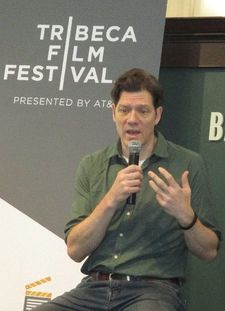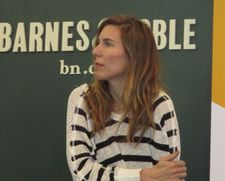 |
| l - r Filmmakers Aaron Katz, Megan Griffiths, Adam Rapp, Amy Berg and Stephen Belber with moderator Mark Adams Tribeca Talks: Adaptation & Creation Photo: Anne-Katrin Titze |
On a sunny afternoon during the Tribeca Film Festival, directors Megan Griffiths (Lucky Them, starring Toni Collette and Thomas Haden Church); Aaron Katz (Land Ho!); Amy Berg (Every Secret Thing with Diane Lane, Elizabeth Banks, Dakota Fanning and Nate Parker); Adam Rapp (Loitering With Intent with Marisa Tomei and Sam Rockwell) and Stephen Belber (Match, starring Patrick Stewart), gathered for a Tribeca Talks: Pen to Paper - Adaptation & Creation panel.
Sidney Lumet's Twelve Angry Men, Julian Schnabel's The Diving Bell And The Butterfly, Uli Edel's Last Exit To Brooklyn, Michael Winterbottom's Tristram Shandy: A Cock And Bull Story and Dead Man Walking, directed by Tim Robbins, were cited as important adaptations of literary works to cinema. And Whit Stillman writing the book after directing his screenplay for The Last Days Of Disco.
The discussion held at Barnes & Noble across from Union Square in Manhattan was moderated by Mark Adams, Chief Film Critic for Screen International and film critic for the Sunday Mirror in the UK.
Following the discussion, I asked each filmmaker to name an adaptation book to screen they are particularly fond of.
![Lucky Them director Megan Griffiths: "Paul Newman wrote to Tom [Hayden Church] and asked him if he'd read the script.](/images/newsite/Lucky_Them_director_Megan_Griffiths_1_225.jpg) |
| Lucky Them director Megan Griffiths: "Paul Newman wrote to Tom [Hayden Church] and asked him if he'd read the script. Photo: Anne-Katrin Titze |
Anne-Katrin Titze: Do you have a favorite film adaptation, one where you would say you love the text and you love the film?
Aaron Katz: There's lots of films. The first thing that comes to mind is something not adapted in a straight way - Tristram Shandy, Michael Winterbottom's film. I think it's incredible because it's a kind of comment on adaptation. It could come off as extremely obnoxious but it's just so funny and free-wheeling. It both is an adaptation of something that's impossible to adapt for the screen and also lots of other things.
Megan Griffiths: I just re-watched Dead Man Walking (1995, adapted from Sister Helen Prejean non-fiction book) which I think is a really underrated film and a great adaptation.
Adam Rapp: It's really hard to find a great book that becomes a great film. One that surprises me every time I watch it is Last Exit To Brooklyn. I think it's an amazing film (1989, based on the novel by Hubert Selby, Jr.). It's kind of a forgotten film.
Amy Berg: I just read The Diving Bell And The Butterfly (the memoir by journalist Jean-Dominique Bauby) I've never read the book [before]. That is a great example made into a film (2007).
Stephen Belber: I don't know if it's my favorite but I like watching Twelve Angry Men. What Sidney Lumet (1957, adapted from a drama written by Reginald Rose)does to make it alive is impressive.
Aaron Katz: I have one more comment, which is something that is adapted the other way. Most of the time you think of a book based on a movie as not something you want to read. But Whit Stillman adapted The Last Days of Disco into a book, which I think is very similar to the movie in some ways but it also has a kind of different perspective. I think that's a really interesting adaptation going in the other direction.
 |
| Loitering With Intent director Adam Rapp: "I was going to be adapting Michael Ondaatje's In the Skin of A Lion which is one of my favorite novels." Photo: Anne-Katrin Titze |
Some points the panel discussed were casting, locations, the dangers of adaptations and involving the authors.
Megan Griffiths on working with the actors: It's really difficult to keep Tom [Hayden Church] on script in the greatest way. Everything that came out of his mouth was like, no one else in the world would think of that way to string a sentence together. He probably improvised more than anybody else in the cast. Toni [Collette] was pretty strict to the script and very able to roll with whatever he said. The two were really interesting together. They never met before this movie and they are very different personalities. In the movie, they meet and have a little antagonism and grow to appreciate and have a fondness for each other. That completely mirrors their on-set experience. It was really gratifying to watch that because I was worried about it at first…. Joanne Woodward is the executive producer of the film and Paul Newman before he passed away was a huge supporter. Paul Newman wrote to Tom and asked him if he'd read the script.
Aaron Katz on filming in Iceland: It's this incredible looking country with things that I've never seen anything remotely similar. It can take away from the self-consciousness and self-analysing and just experiencing it. And that's what the characters in the movie are doing too…. We went to a geyser which erupted erratically. It's so cool to see a geyser that it's hard not to react. That was a scene just sketched out in the script. It's really important for me to balance improvisation and the script. It's important that improvisation comes out of characters that they really know… It was also really important for us to capture the actual silence [of Iceland]. You would hear the actors' voices and that was actually all you would hear, which was strange and counter-intuitive. It gives it a really unique sound.
Stephen Belber on casting: Frank Langella played the part on Broadway. I developed it with him together. He had a window in his schedule when we could do it. And we started looking around. I soon started targeting on Patrick [Stewart], as a guy who can convey a huge amount of emotion in a very subtle way…. Not working with assholes is good [advice]. Make sure you like the people you work with, finding a way to make sure that there's a rapport there.
 |
| Every Secret Thing director Amy Berg: "We had Laura Lippman, the author of the novel, who is very good friends with Frances McDormand, our producer." Photo: Anne-Katrin Titze |
Amy Berg on casting: We started with Diane Lane. She was my choice. She understood that part better than anyone I could imagine. And the rest of the women in the cast are amazing. There are a lot of great parts…We had Laura Lippman, the author of the novel, who is very good friends with Frances McDormand, our producer. She came on set one day, stayed for an hour, in and out and that was it. Then she came to one of the early screenings… My film is not linear, I didn't think in terms of three acts. It's more about making sure you knew where every character was at.
Adam Rapp on adapting for the screen: I found that I lost so many words when I got actors in front of the camera. I trusted the camera and what was going on in their eyes and how thought was transferred in their eyes…There was about a three week period where it looked like I was going to be adapting Michael Ondaatje's In the Skin Of A Lion which is one of my favorite novels. I don't think it would have helped the experience to be too reverential about it. I'm a novelist myself and I probably have too much love and respect for that process, so it's probably not a good idea for me to adapt his book. If I were to adapt someone's book, I would want to spend a lot of time with them and make sure I'm at least getting what their impulse was.





















